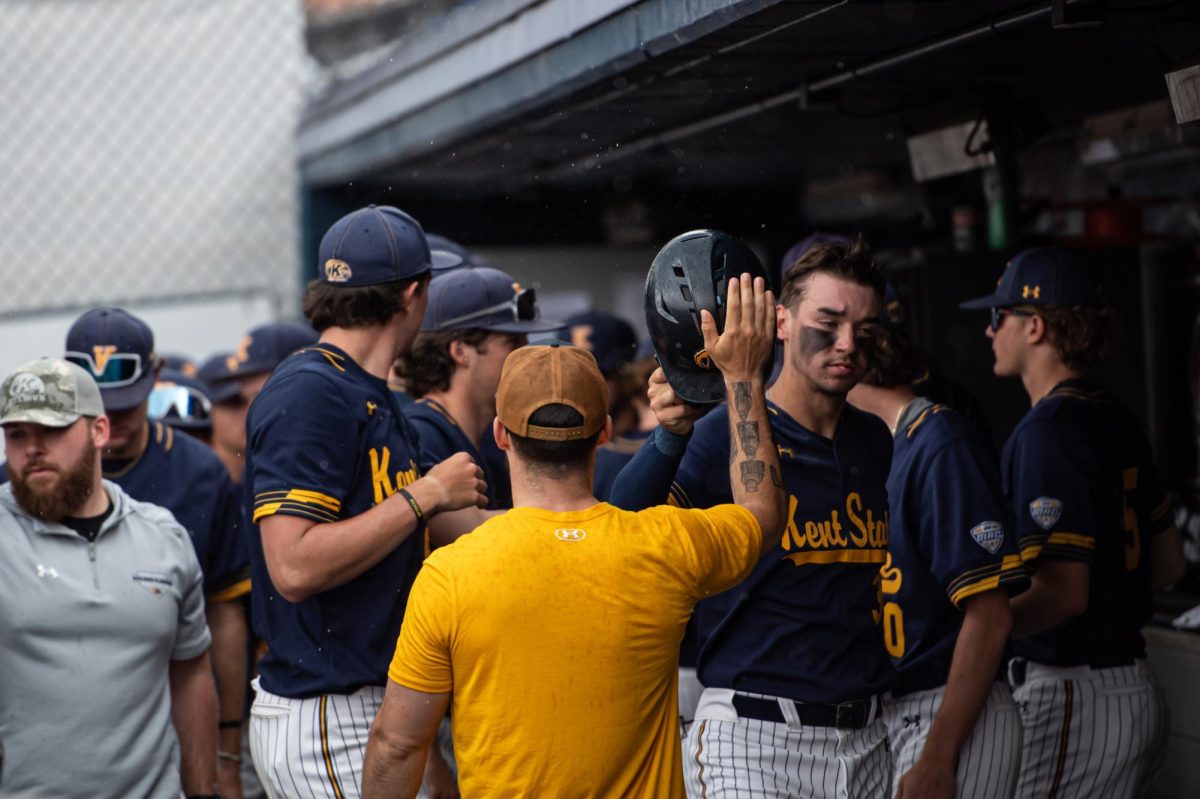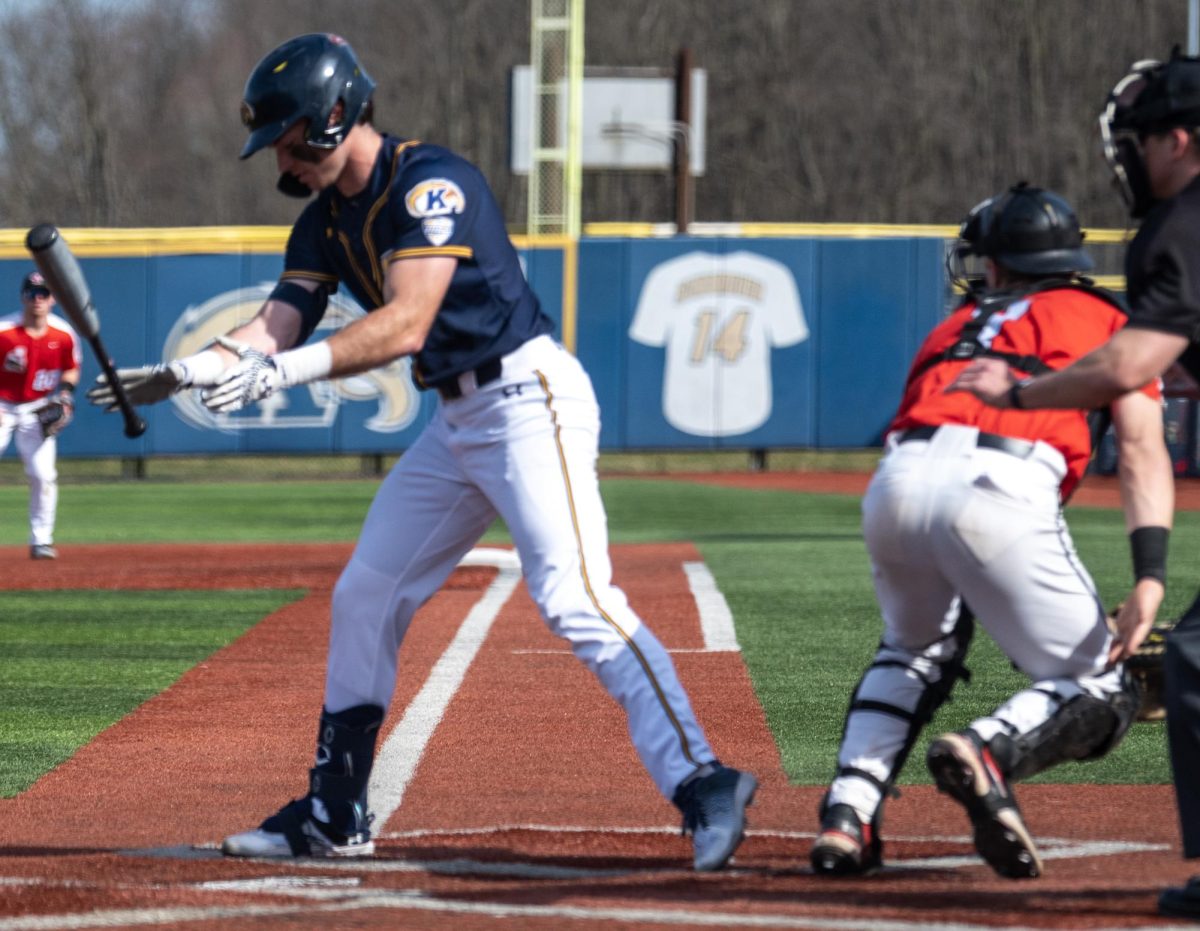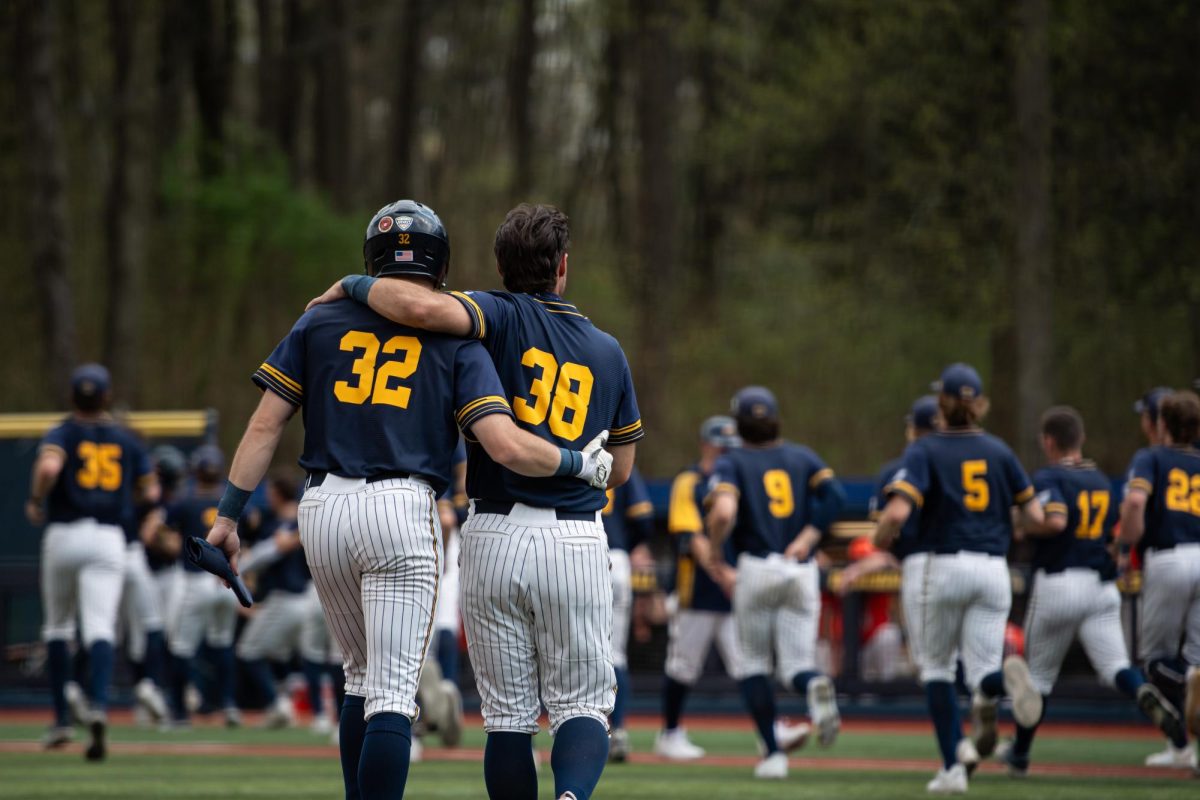After spending 14 years playing professional baseball both in the United States and overseas, Mike Birkbeck decided to hang it up and come back to Kent State, which had become a familiar place for the ex-pro.
“My relationship with Kent goes back to my playing days,” he said. “When the fieldhouse was constructed and finished in 1990, during the last six years I played, that’s where I worked out in the offseason.
“I got to be close with the coaching staff and being around the players — it became a very comfortable place. When I retired from playing, the head coach at the time, Rick Rembielak, was in need of a pitching coach and asked me if I’d be interested in doing it and in January of 1997, I started here, and I’ve loved every minute of it.”
Birkbeck spent six seasons playing in the major leagues as a starting pitcher for the Milwaukee Brewers and New York Mets.
He also spent time in AAA minor league baseball and overseas in Japan, playing for the Yokohama BayStars of the Nippon Professional Baseball league — the highest level of baseball in Japan.
While in Major League Baseball, Birkbeck played in 54 games. He was 12-19 with a 4.86 ERA, 1.524 WHIP, 149 strikeouts, 319 hits allowed, 93 walks and two complete games over 270.1 innings pitched.
His best season came in 1988, when the righty went 10-8 with a 4.72 ERA in 23 appearances.
While playing in Japan in 1996, Birkbeck suffered a broken fibula on a ball hit toward him, ending his career after 14 seasons.
Coming to Kent
One year later, in 1997, Birkbeck was on the Kent State baseball staff as a pitching coach, and he has produced wins and MLB talent since then.
“He brings a lot of experience both as a player and as a coach,” coach Jeff Duncan said. “He’s coached here for a long time and has developed some pitchers and done a really good job.”
“They have a big belief in him. We have a really good coaching staff, and we just continue to work and continue to grow and continue to get better, and Birkbeck is a big piece of that.”
After his playing days were over, Birkbeck brought the most important thing he learned with him when coaching young pitchers: “Throwing strikes.”
“It cures a lot of problems,” he said. “Working hard, having talent and realizing that you got to go out there every single day with a purpose. When you’re blessed to be around 18 to 22-year-olds that have talent and a desire, it makes it really enjoyable.”
Since 2004, Birkbeck has served as the pitching coach and associate head coach on the KSU team and is regarded as one of the best pitching coaches in the country.
“I am very humbled by that,” Birkbeck said. “It sure does help when you have very talented, hard-working young men, too, and they get all the credit.”
“I’m only as good as they are in most cases. We’ve been blessed here to have some really, really good pitchers and better young men.”
Birkbeck has spent 27 seasons with the Flashes and continues to stay with the team despite the recognition because of the value of Northeast Ohio.
“This is a special place to me,” Birkbeck said. “My wife graduated from here; my son graduated from here. I grew up in the area from Orrville, Ohio, and I went to school down the road.”
“Northeast Ohio has been very special to me for my entire life. Our administration and the department have provided us with everything we need to be successful, and I wouldn’t have it any other way.”
Creating wins, major leaguers
In those 27 seasons with the Flashes, the team has flourished, recording 11 Mid-American Conference regular season championships, 10 MAC tournament championships, 10 NCAA Regional Tournament appearances, one NCAA Regional Tournament Championship and one College World Series appearance.
The team has also won 933 times in Birkbeck’s time, and all of the top five totals for team strikeouts in a season for the program belong to Birkbeck’s staff, and the two seasons with the lowest ERAs belong to Birkbeck, as well.
In 2012, Birkbeck was awarded the American Baseball Coaches Association/Baseball America Division I National Assistant Coach of the Year Award.
Birkbeck has also succeeded in creating league-ready pitchers in college — he has helped 53 pitchers get drafted or signed into professional baseball.
This includes two first-rounders, left-handed relief pitcher Andrew Chafin in 2011 (43rd pick — Arizona Diamondbacks) and left-handed starting pitcher Eric Lauer in 2016 (25th pick — San Diego Padres).
Lauer won National Pitcher of the Year and MAC Pitcher of the Year awards in 2016.
The first-rounders needed a pitching coach to maximize their potential, and Birkbeck has his own way of achieving that — a one-sentence mantra that he has said since his playing days:
“I tell them, ‘Be who you are, do what you do, just do it really well.’”
Along with Chafin and Lauer, eight Birkbeck-directed KSU pitchers have appeared in the major leagues, including Matt Guerrier, John VanBenschoten, Dirk Hayhurst, Andy Sonnanstine, Chris Carpenter and Taylor Williams.
“Oh, you know what? It’s a thrill,” Birkbeck said about watching his pitchers in the MLB. “I know them personally, but I also know how hard they’ve worked and the time and effort that they put into their craft, and every single one of them are just really good people first and foremost. It’s a lot of fun to watch them progress.”
Birkbeck has also coached 46 All-MAC, 21 All-MAC Tournament, 14 All-region and 13 All-American nominees.
When working with student-athletes, Birkbeck does a lot of things to get them adjusted to KSU baseball, including “get[ting] them to go to class first.”
“After that, we get them acclimated to the way we do things, [from] how we play catch to how we lift weights to the way we train, and then they just usually acclimate themselves,” he said. “Our older guys do a really good job of getting those guys in tune with how we do things here at Kent State.”
One of the biggest things Birkbeck does differently when coaching players is teaching his athletes to throw slower instead of increasing pitching velocity in the beginning.
“A lot of these kids nowadays focus a lot on velocity, and one of the first things we do when we get them here is try to get them to learn how to throw the ball slower,” Birkbeck said. “That’ll never change because pitching is nothing more than working fast, throwing strikes and changing speeds.”
According to Duncan, Birkbeck’s coaching style is seen as a huge strength for KSU due to his ability to coach different players.
“He has a tremendous feel — he’s got a lot of experience and he treats each pitcher differently,” Duncan said. “Not everybody’s cookie cutter in his development style. He has a lot of feel to get the most out of each guy.”
Birkbeck is always on the hunt for the next major league talent for KSU. He serves in assisting in the evaluation and recruitment of pitchers and spearheads the pitching staff’s off-season winter individual throwing workout programs for Kent State.
After producing a lot of professional baseball talent, Birkbeck said similar talent can be found on the team today.
“We’ve got some really talented kids,” Birkbeck said. “I don’t want to put any names out there, but as they continue through their careers, you’re going to probably see a couple of these guys have some success at the next level.”
Some pitchers performing at high levels this season include redshirt junior Calvin Bickerstaff and juniors Eric Chalus, Peyton Cariaco and Jack Kartsonas.
Duncan said he does minimal work with the pitching staff because of the trust he puts in Birkbeck and his ability to coach athletes.
“Every once in a while, he bounces things and we talk a lot in between games more than anything from a starting rotation standpoint,” Duncan said. “But other than that, I let him do his job. He does a really good job.”
Some players come to KSU with talent, but Birkbeck noted that players, “Work just as hard.”
“We try to do a really good job in evaluating them, not only as an athlete, but as a student and as a person,” Birkbeck said. “We try to identify talent, obviously, but sometimes it’s not the most talented guy; it’s the guy that wants it the most.”
Birkbeck has accomplished a lot — from playing in Major League Baseball to playing overseas in Japan, to becoming pitching and associate head coach for Kent State and seeing a lot of success on that front, and Duncan believes there is not much left for Birkbeck to achieve before he steps away from the game of baseball.
“Just to continue to keep the joy of what he’s doing,” Duncan said about his future goals for Birkbeck. “We enjoy working together — our whole staff does, and continuing to win ball games. We just get to work and work hard to get our guys prepared to win and to be the most successful version of themselves on the field.”
“That’s the biggest thing. We want them to be successful any way we can pull that out, and Birky does a good job of that.”
John Hilber is assistant sports editor. Contact him at [email protected].









